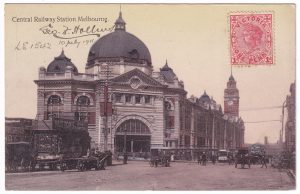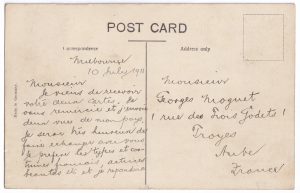[Editor: This postcard incorporates a photo of Flinders Street Station (Melbourne, Victoria). The postcard is dated 10 July 1911. The handwritten text on the card is in French.]
[Front of postcard]
Central Railway Station Melbourne.
[Handwritten text, in italics]
Geo. F. Hollins
L E 1542
10 July 1911
[A photo of the Flinders Street railway station (Melbourne, Victoria).]
[Reverse of postcard]
Melbourne
10 July 1911
Monsieur,
Je viens de recevoir votre deux cartes.
Je vous remercie et j’envoie deux vues de mon pays.
Je seror his heureux de faine echaneur avec vous.
Je prefere les types et costumes francais, actrices beautes etc et je repondira.
[Addressed to:]
Monsieur Georges Mognet
1 rue de Trois Godets
Troyes
Auber
France
Made in Germany.
[No identifying information about the manufacturer was included on the postcard.]
Source:
Original document
Editor’s notes:
Dimensions (approximate): 138 mm. (width), 89 mm. (height).
A rough translation (via Google Translate) of the handwritten text in French is:
Sir,
I just received your two cards.
I thank you and I send two views from my country.
I will be happy to chat with you.
I prefer French types and costumes, beautiful actresses etc and I will answer.
It appears that the writer was a collector of picturesque postcards (like many people of the time); and, as was the practice of many postcard collectors, he corresponded with other people in order to exchange postcards. The writer has received two postcards from a Frenchman, and has sent two in return; he mentions that he likes postcards which show French scenarios, French costumes, and beautiful French actresses, and assures the Frenchman that (upon receiving postcards from him) he will answer in return.
The Rue de Trois Godets (Street of Three Buckets) is located in Troyes, which is the capital of Auber, in France. The street (which is also rendered as “Rue de 3 Godets”) is situated to the north-east of the Cathédrale Saint-Piérre-et-Saint-Paul (Cathedral of Saint Peter and Saint Paul); it connects with Rue de la Cité at its north end and with Rue du Bon Pasteur at its south end, and runs parallel with Rue Simart.
See: 1) Google Maps [for a map view of the Rue de Trois Godets]
2) “Troyes”, Wikipedia
3) “Troyes Cathedral”, Wikipedia
4) “Saint-Pierre-et-Saint-Paul: cathedral, Troyes, France”, Encyclopædia Britannica
Geo. = an abbreviation of the name “George”
[Editor: For ease of reading, the original text has been separated into paragraphs, and punctuation has been inserted as deemed appropriate.]


Leave a Reply